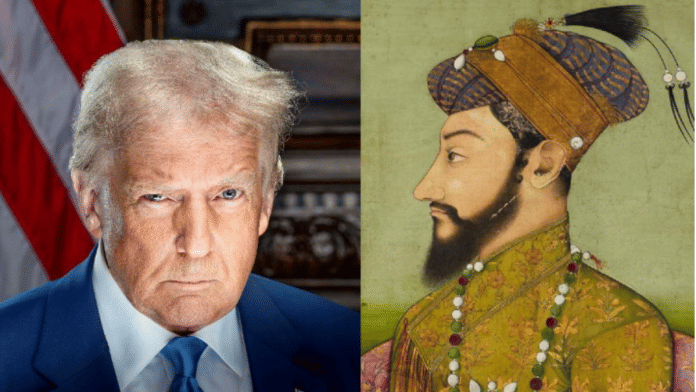Thank you dear subscribers, we are overwhelmed with your response.
Your Turn is a unique section from ThePrint featuring points of view from its subscribers. If you are a subscriber, have a point of view, please send it to us. If not, do subscribe here: https://theprint.in/
The film Chhaava has once again thrust Aurangzeb into the political spotlight, with his legacy becoming a tool for modern-day ideological battles. Political opportunists invoke his reign, some to demonize, others to glorify, each reshaping history to fit their narratives. Many people frequently invoke his oppressive policies to fuel communal divisions, using his reign as a rallying point for right-wing fascism. However, beyond being a convenient historical villain for modern politics, Aurangzeb’s true legacy is the destruction of the Mughal Empire. His policies, marked by religious bigotry, economic recklessness, and militaristic overreach, fractured the empire, rendering it vulnerable to internal rebellion and external conquest. In an uncanny parallel, Donald Trump’s leadership mirrors this trajectory, as his tenure, both past and present, threatens to accelerate USA’s decline from its position as a global superpower. Or the other way around, we can say that Aurangzeb was the Donald Trump of Mughal India.
Both figures thrived on division as a political strategy. Aurangzeb, deviating from the pluralistic governance of his predecessors, reinstated the jizya tax on non-Muslims, sanctioned temple demolitions, and pursued repressive policies against Sikhs and Marathas, igniting widespread unrest. Trump, through measures such as the “Muslim Ban,” his alignment with white nationalist rhetoric, and his stringent immigration policies, similarly cultivated an exclusionary political climate. Neither leader sought to unite their respective populations; instead, they mobilized support by deepening societal fractures and capitalizing on fear and resentment.
Yet both also projected a carefully crafted image of tolerance & friendship when it suited their political objectives. Aurangzeb strategically provided grants to select Hindu & Jain temples, appointed Hindu officials, and engaged in calculated political alliances. However, these actions were pragmatic rather than ideological, serving to sustain his broader, exclusionary policies. Trump’s approach mirrors this contradiction. While he engaged in outreach efforts to Black and Latino voters, promoted criminal justice reforms, and made symbolic gestures of inclusivity, his administration simultaneously enacted judicial appointments and legislative measures that undermined minority rights. These actions were not indicative of genuine inclusivity but were, instead, strategic maneuvers aimed at securing political advantage.
The economic policies of both leaders exacerbated national instability rather than fostering prosperity. Aurangzeb’s incessant military campaigns, particularly in the Deccan, placed immense financial strain on the Mughal treasury. His high taxation policies, suppression of trade, and prolonged wars drained resources, leaving the empire vulnerable to internal and external threats. Trump’s economic policies, similarly, prioritized short-term political gains over long-term stability. His tax cuts disproportionately favored the wealthy, significantly increasing national debt, while his trade wars disrupted American industries and weakened global economic alliances. In their pursuit of power, both leaders enacted policies that ultimately destabilized their respective nations.
The consequences of Aurangzeb’s leadership were swift and irreversible. His relentless expansionist ambitions overstretched the empire, while his alienation of critical allies—including Rajputs, Marathas, and Sikhs—fractured Mughal authority. Within decades of his death, the empire’s decline accelerated, with regional powers such as the Marathas and British colonial forces capitalizing on Mughal weaknesses. Trump’s America exhibits similar signs of decline. His first presidency witnessed an erosion of democratic norms, and his return to office in 2025 has intensified institutional instability. His disregard for governance, hostility towards the judiciary, and emboldenment of far-right extremism have collectively undermined the pillars of American democracy. As his presidency unfolds, the United States’ global influence is visibly diminishing.
History does not merely repeat itself; it offers warnings. Aurangzeb perceived his actions as consolidating Mughal dominance, yet his policies ultimately precipitated its downfall. Trump’s leadership follows a comparable trajectory, as his governance accelerates America’s internal divisions and international decline. The notion of the United States as an unchallenged superpower is no longer an unquestioned reality—it is a status increasingly under threat.
Aurangzeb’s most enduring legacy was not his territorial conquests, his policies, his claims to religious devotion, or his image as a temple destroyer, as many nowadays claim—it was his role in dismantling the very empire he sought to strengthen. If America fails to recognize the implications of Trump’s leadership, he may well be remembered in a similar light: as the leader who, while professing to make his country great, ultimately presided over its decline. Maybe we will witness the fall of the USA from the position of a superpower within the next four years.
These pieces are being published as they have been received – they have not been edited/fact-checked by ThePrint.



That’s very well put out Israr. I do agree with most part of it and I do hail you for such unbiased journalism. But as a matter of fact, the role of deep sate in US can’t be undermined who are the most rational state actors and could very well neutralize Trump’s nuances and can tackle China’s advances .
But on the other hand, Aurangzeb’s courtesans and successor were blinded by religious vengeance and lacked scientific temperament as the era of industrialization started to play a game-changer in deciding the fate of imperialism all around the globe.